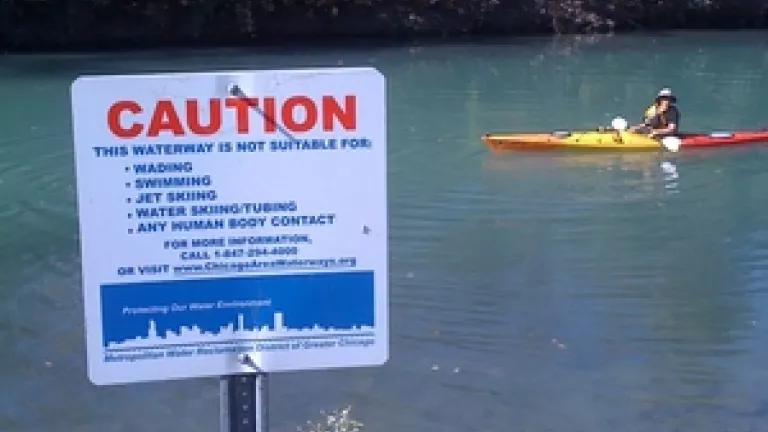
Last year, I pointed out that USEPA had finally stepped in as the adult in the room, moving to exercise federal authority in the longstanding Chicago River disinfection controversy. Today, the adult has finally had it. In a forceful letter sent yesterday to Illinois EPA, USEPA states that Illinois must act now to issue regulations protecting River recreation. And if it doesn’t, USEPA will issue those regulations itself. In other words, don’t make us come back there!
As is usually the case when adults say things like that, there is a long and frustrating history behind it.
USEPA points out in the letter that Illinois EPA started the process of revising water quality standards for the River nearly a decade ago. And previous to that, the standards had not been looked at since 1985. This, despite the fact that the Clean Water Act requires that standards be re-evaluated every three years. After Illinois EPA proposed new standards in 2007 that would require the Metropolitan Water Reclamation District, Chicagoland’s sewage authority, to disinfect its sewage to protect River recreators, the District pulled out all the stops to oppose them – at a cost of more than $13 million and counting to their ratepayers. The result was, predictably, interminable and ongoing delays (interminable delays being, of course, a core competency of the District, which wants til 2029 to clean up its combined sewer overflows). After the longest public rulemaking hearing in the history of the Illinois Pollution Control Board – which has worked hard to move the proceeding along despite the District’s shenanigans – all we have to show for it so far is a draft decision on the initial phase of the rulemaking concerning which recreational uses to protect, and no decision on whether disinfection will be required.

And the delays were not the only problem that drove USEPA to bring down the hammer. The regulations proposed in 2007 by Illinois EPA would only protect at most “incidental contact recreation” – meaning the kinds of boating activities such as kayaking where, according to Illinois EPA, you don’t immerse yourself in the water intentionally but might do so accidentally. While we have strongly supported this proposal, because it is a vast improvement over the current set of non-standards applicable to the River, USEPA correctly points out – as it has a little more subtly in the past – that more is needed to fully protect River users. For one thing,it became clear in the Board’s rulemaking hearings that canoers and kayakers pretty routinely get wet, not just from the occasional capsize. For another, it has also become clear that people are increasingly engaging in full-immersion activities in the River – swimming, waterskiing, tubing, and the like. It’s not a surprising development, given that parks, boat launches, and river walkways are increasingly drawing people to the water’s edge. As the Chicago Tribune’s Mike Hawthorne points out in breaking the news today, the River has essentially become Chicago’s “second lakefront.” The lawyers and regulators can pontificate all we want about whether full immersion uses are appropriate, but while we’re busy doing that through these hot spring days, the public is going to want to jump in and cool off.
The USEPA’s determination applies to only specified portions of the CAWS, and accordingly would require disinfection only at the District’s Northside and Calumet plants, but not at the Stickney plant discharging into the Sanitary and Ship Canal. While the Canal should not be permanently cut off from recreational use – the Clean Water Act does not allow that – USEPA is correct in discerning that the heaviest recreational use is occurring downstream of the other two plants, and hence disinfection is more urgent there.
USEPA’s decision is grounded in the clear directive of the Clean Water Act that water quality standards must protect both fishing and swimming uses whenever those uses are “attainable.” The Agency also relied substantially on the reams of information presented during the last three and a half years of Pollution Control Board hearings by NRDC and the other environmental organizations supporting Illinois EPA’s rulemaking.
The Agency decisively smacks down the District’s longstanding complaint that disinfection is too expensive. In fact, as pointed out in the letter, Chicagoland pays some of the lowest sewer service fees in the country. Given the District’s large service area, which spreads out costs, disinfection is likely to increase Cook County taxes by less than $2 per household per month on average.
The USEPA letter makes clear that the more protective water quality standards must be promulgated “expeditiously.” If that is going to happen, everyone – and we’re looking at you, Metropolitan Water Reclamation District – is going to have to stop squabbling and pull together. Or else USEPA is going to pull this car over, and this time they really mean it.
Photo courtesy of Friends of the Chicago River

